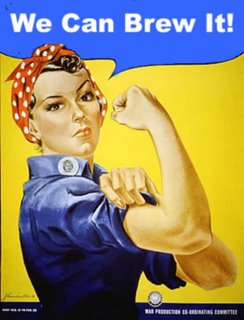
I "borrowed" this article from a website I found while researching more about the history of female brewers (brewsters). It's interesting reading, and I'll link to their site, so hopefully no one will mind - Scottish Beer & Pub Assn.
~~~~~~~~~
Leave it to the Ladies! Basic brewing is a surprisingly simple process, and by the 15th century the Scots had caught on big style! Domestic brewing, particularly in farming communities, became so widespread at this time that a license duty of four Scots pence a year was imposed on all persons engaged in brewing.
Ale was churned out in the farms, taverns and houses of almost every village in Scotland. Brewing followed a seasonal programme as without adequate refrigeration techniques, beer could only be made successfully in the colder months between October and March - which followed on nicely from the harvest season!
Woman's work? Though the revival of home brewing in the 1970s seems to have been largely a male affair, brewing in the late middle-ages was women's work. And it would appear that the farming women took quite a liking to it too: the term 'brewster-wife' was soon used to describe fat women.
During this time most brewers - or 'broustaris' as they were known - brewed only enough to suit the needs of their immediate family. But as particular individuals became more adept at this ancient art, so public breweries began to surface. In 1509, a list of brewers in Aberdeen records 152 people, all of whom were women.
In Edinburgh, the beer market was dominated by 300 Alewives. Some have suggested that brewing was simply an extension of baking, so it’s not surprising that so many women were involved. However, the fact that so many records list women, 'free from husband, living or dead’, would suggest that brewing may also have afforded women a degree of independence too.
Some women ran alehouses, both serving customers on the premises and selling drink to 'take out'. And until the 18th century, married women brewers and publicans in Scotland, demonstrated their independence by using their maiden names - a practice that was not accepted in England.
Growing moral prejudice Perhaps because brewing provided women with a lucrative income, it attracted a great deal of moral disapproval and laws were passed in the late 16th Century aiming to prohibit women from working in alehouses. However, there is strong evidence that women continued to work as brewers in Edinburgh right up until the 1790’s.
By then other changes were also afoot. The rise of the mercantile and industrial centres also created a far greater demand than traditional cottage breweries could sustain, and so the great brewing dynasties were born.
It wasn’t until the First World War that women once again found themselves at the forefront of the brewing industry. Holding the fort while the men fought and supplying troops at home and abroad with much needed refreshment.

No comments:
Post a Comment